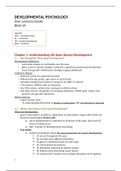Samenvatting
Developmental Psychology - full short summary
- Instelling
- Rijksuniversiteit Groningen (RuG)
This is a full summary for the Exam of the "Developmental Psychology"- course in Block 2A (Psychology Bachelor, English track). The summary briefly captures all relevant chapters of the course book "Life-Span Human Development", Edition 9e. It sticks close to the literature, but does not focus on ...
[Meer zien]





